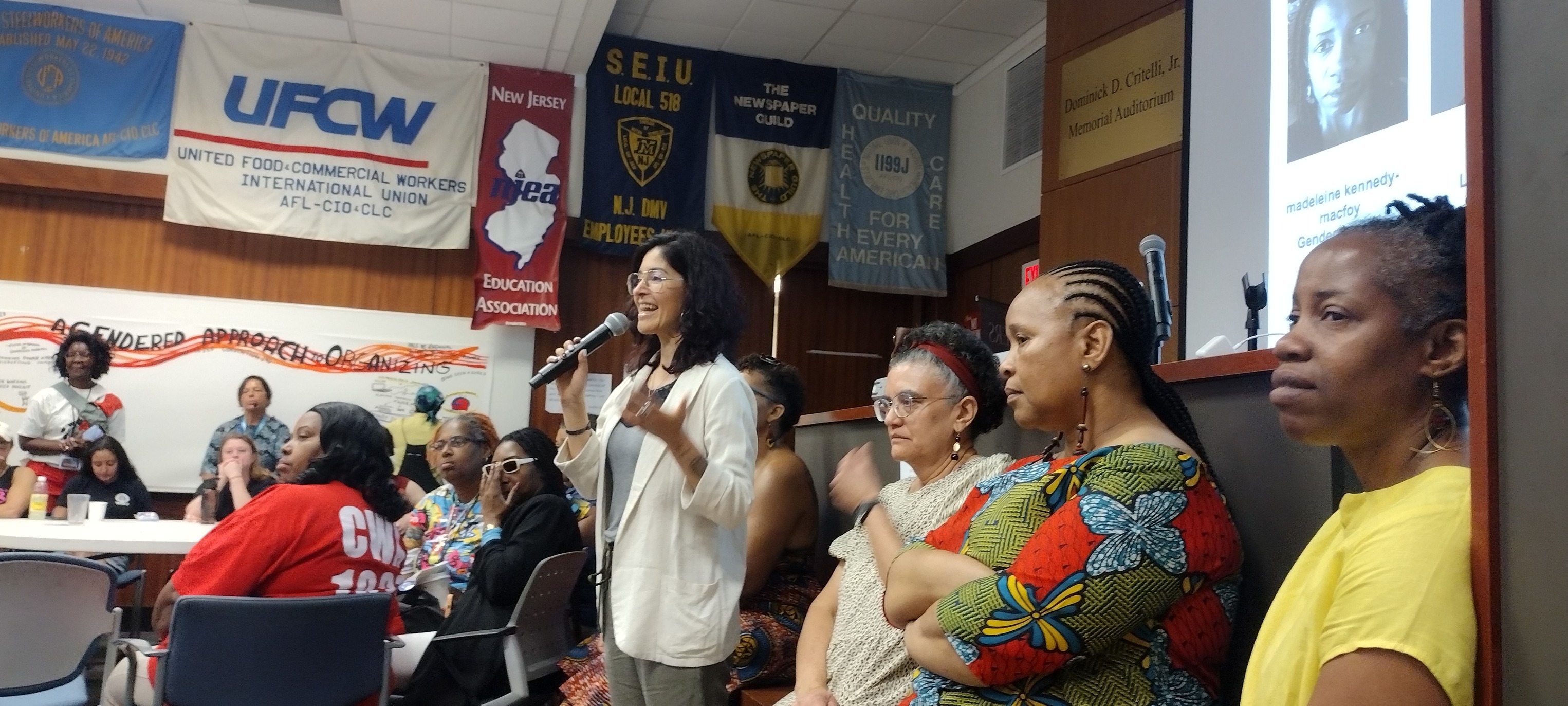
The objectives of the Transformative Global Leadership Project are to create a robust network of women* labor leaders that are connected through shared learnings and understandings of transformative women’s leadership. In partnership with the Labour Research Service, Education International, the AFL-CIO, and other aligned economic justice organizations globally, we have developed and implemented robust support, including workshops, modules, surveys, and other materials to support ongoing network building while addressing the needs of women leading or aspiring to lead within the global labor movement.
Through bi-weekly conversations of facilitators and interactive workshops with each facilitator’s cohort of participants across the world, we have engaged diverse leaders to catalyze ongoing discussions about intersectionality, transformative women’s leadership, leading authentically as a practice, and more. We are also working with women leaders to address organizational cultures in labor institutions that have historically been racist, sexist, and otherwise exclusionary. This work continues to provide new pathways and innovations around leading during the Covid-19 pandemic because of the unique opportunity for women labor leaders to connect and learn from one another globally.
*The term “women” encompasses cisgender, transgender, gender non-conforming, those who self-identify as women, and across a range of gender expressions.
CIWO hosts Global Strategy Session with allies at IFWEA Conference in Cape Town, South Africa
CIWO, Labour Research Service (LRS) and allies convened a global strategy session in Cape Town, South Africa, including 31 labor educators, facilitators, activists and leaders working in highly feminized & low-wage precarious sectors, as well as from the building trades sector. Collectively, this group represented 22 organizations and 15 countries in Asia, Africa, Europe, North America, and South America. This strategy session was organized in concert with the 24th General Conference of International Federation of Workers' Education Association (IFWEA) from December 6-8, 2023.
The kick-off activity was a Leadership Journey Map (LJM) workshop for 70+ participants, co-hosted by CIWO and LRS. The LJM is a visual mapping tool, which has been developed through the Transformative Global Leadership Program (TGLP) and piloted, in person and virtually, among more than 300+ women and nonbinary leaders, activists, and educators from across the world. One participant summed up her experience of the LJM workshop by saying:
“It forced me firstly to think about myself through the framework of leadership and secondly, to think of the many places where I have led without realizing.”
TGLP Core Facilitators (CIWO, LRS, Gender at Work, Project Palabra, IDWF, and ITUC) held strategy sessions to discuss transformative leadership development with a gender frame. Through a participatory and emergent facilitation process, we engaged participants in an examination of transformative leadership both conceptually and in practice. Using small groups, role play, storytelling and reflection exercises, we worked towards initial recommendations for achieving, sharing, and encouraging it at both individual and organizational levels.
This convening is part of a multiyear project jointly held by CIWO and LRS, working with allies from transnational organizations who are advancing experimental approaches to doing leadership development. Share in the full experience with our flipbook here.
CIWO joins the Global 16 Days Campaign to Address Gender-Based Violence (GBV) in the World of Work
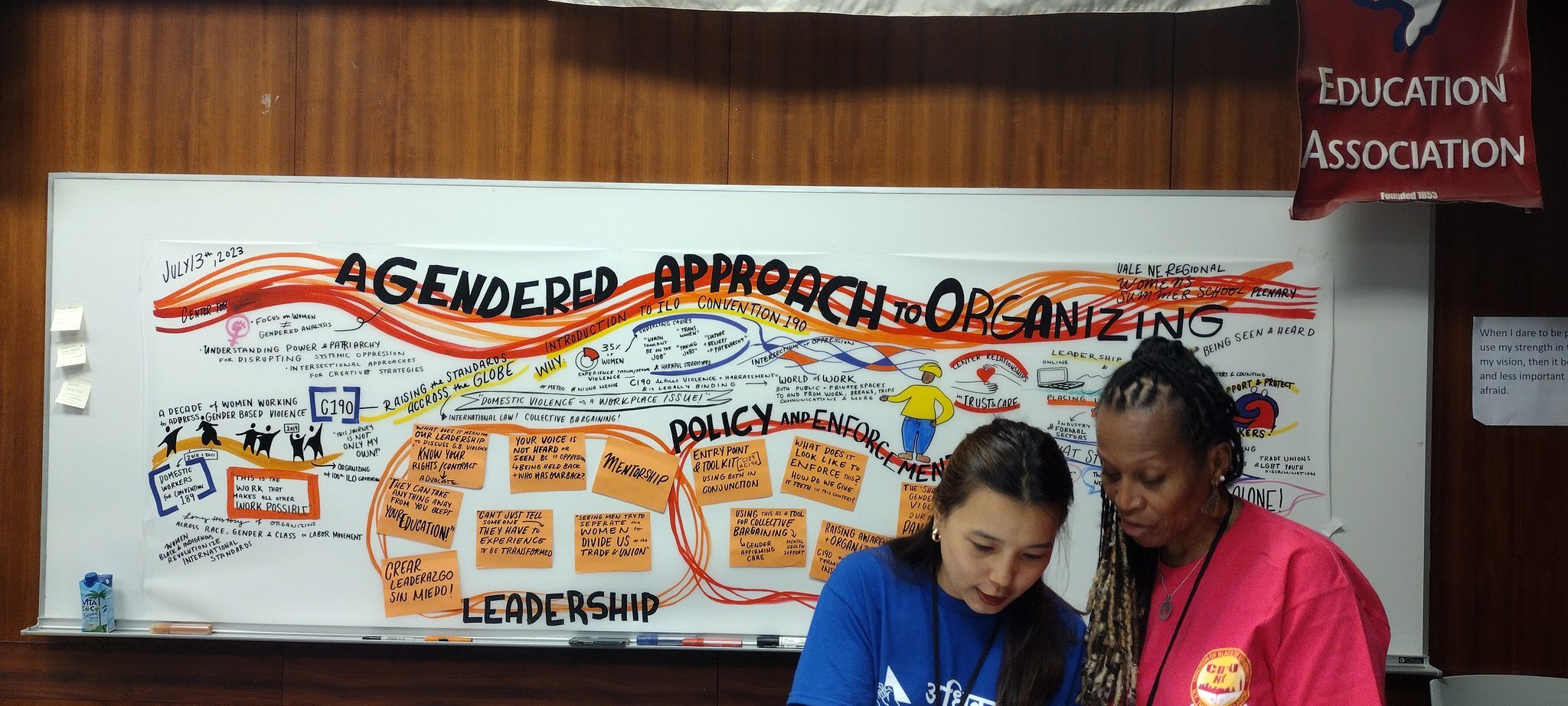 Women workers in both formal and informal sectors face varied forms of gender-based violence (GBV) and harassment. According to the findings of a 2022 survey led by the International Trade Union Federation (ITUC) in 79 countries, 73% of unions surveyed pointed out that violence and harassment in the world of work has increased in the last five years. Women are disproportionately impacted by GBV in the world of work due to harmful gender stereotypes, multiple and intersecting forms of discrimination, and unequal power relations. For example, existing data shows how women with disabilities, indigenous women, women of African descent, and non-binary groups face increased risks of GBV due to the intersection of gender, race, ethnicity, disability and other determinants.
Women workers in both formal and informal sectors face varied forms of gender-based violence (GBV) and harassment. According to the findings of a 2022 survey led by the International Trade Union Federation (ITUC) in 79 countries, 73% of unions surveyed pointed out that violence and harassment in the world of work has increased in the last five years. Women are disproportionately impacted by GBV in the world of work due to harmful gender stereotypes, multiple and intersecting forms of discrimination, and unequal power relations. For example, existing data shows how women with disabilities, indigenous women, women of African descent, and non-binary groups face increased risks of GBV due to the intersection of gender, race, ethnicity, disability and other determinants.
This calls for strong workplace policies that address GBV as well as national laws and regulations to address the same. A milestone moment was achieved for both labor and women’s rights movements when ILO Convention 190 (C190) was adopted in 2019. C190 is the international treaty to address violence and harassment in the world of work. To date, 36 countries have ratified C190. C190 frameworks can also be implemented even before its formal ratification by countries through Occupational safety policies or collective bargaining agreements. The Dindigul Agreement which incorporated provisions of C190 to provide protection for 5,000 garment workers against GBV in Tamil Nadu in India offers a strong example of implementation and enforcement.
If GBV in the world of work is unaddressed, it can spiral into femicides or the gender-related killings of women and girls. Certain sectors are at heightened risk of femicides due to intersecting forms of discrimination faced by women workers. For example, female sex workers are 18 times more likely to be killed than women in other sectors. Women who work in the formal sector such as women judges, parliamentarians, trade union leaders, journalists, and activists who publicly advocate against GBV can also be at increased risk of femicides.
CIWO’s Transformative Global Leadership Program (TGLP) has investigated the reasons why women and gender oppressed groups are being left out of decision-making spaces including from trade unions, worker centers and economic justice organizations. This joint initiative of CIWO and Labour Research Service (LRS) in South Africa examines the leadership journeys of women and nonbinary groups through a Leadership Journey Mapping (LJM) workshop. This visual mapping tool uses metaphors and narrative storytelling to document the unique experience of women worker leaders. More than 150+ women from 26 countries have participated in these workshops. A recurring theme emerging from these workshops is how issues pertaining to risk and safety negatively impact women and deter them from pursuing leadership.
The 16 Days of Activism Against Gender-Based Violence (also, the Global 16 Days Campaign) is an international campaign that runs annually from November 25 (International Day for the Elimination of Violence against Women) to December 10 (Human Rights Day). It was first launched in 1991 by activists at the Center for Women’s Global Leadership (CWGL), Rutgers University. From 2019 to 2021, the Global 16 Days Campaign at CWGL focused on the multi-year theme of ending gender-based violence (GBV) in the world of work, by calling on countries to ratify C190.
During this Global 16 Days Campaign, CIWO calls on all governments to ratify and implement C190 and all stakeholders to address GBV and femicides in the world of work. In July 2023, CIWO joined hands with its global partners Gender at Work, Labour Research Service (LRS), & the International Domestic Workers Federation (IDWF) to host a plenary session on C190 which was attended by 140+ participants at the 46th United Association For Labor Education (UALE) Northeast Regional Women’s Summer School at Rutgers University. “CIWO continues to remain committed to addressing GBV in the world of work and we believe in a gendered approach to organizing around this. This can be fundamental to shifting the culture of trade unions and worker centers to make decision-making spaces more accessible for women,” said Sheri Davis, Associate Director at CIWO.
CIWO Heads to South Africa for IFWEA's 24th General Conference
CIWO, in partnership with Labour Research Service (LRS) in South Africa, will host a Leadership Journey Mapping (LJM) workshop and an accompanying strategy session during the 24th General Conference of International Federation of Workers' Education Association (IFWEA) in Cape Town, December 4-8, 2023. The workshop will highlight the Transformative Global Leadership Program (TGLP), a joint initiative of CIWO and LRS exploring transformative practices and experimental approaches to leadership development. Workshop participants will experience a visual mapping exercise followed by an interactive discussion on lessons learned on the use of narrative, metaphor, and technology for gendered approaches to leadership development.
Workshop participants will also join a discussion on lessons learned about the use of technology, graphic notation, and metaphor to bridge cultural, language, digital and geographic divides. The Leadership Journey Map (LJM) has been offered both virtually and in-person, completed by more than 150+ women in countries including Nigeria, Sri Lanka, Belgium, Pakistan, South Africa, Philippines, United States, the Dominican Republic, Indonesia, Zimbabwe, and others.
CIWO and LRS, along with partners from Gender at Work, International Domestic Workers Federation (IDWF) and STOKE Collective, will also host a multi-day strategy session in conjunction with the IFWEA Conference. We will convene allies from Asia, Africa, Latin America, and the Middle East. The focus is advancing leadership development within worker justice organizations and institutions, giving special attention to feminized sectors and sectors where women are excluded from opportunities. The long-term goal is increased participation of gender minorities including women, nonbinary people etc., in decision-making roles within labor rights and worker justice movement building.
46th Women's Summer School Plenary on Gender-Based Violence in the Workplace (ILO C190) & CIWO's Transformative Global Leadership Program
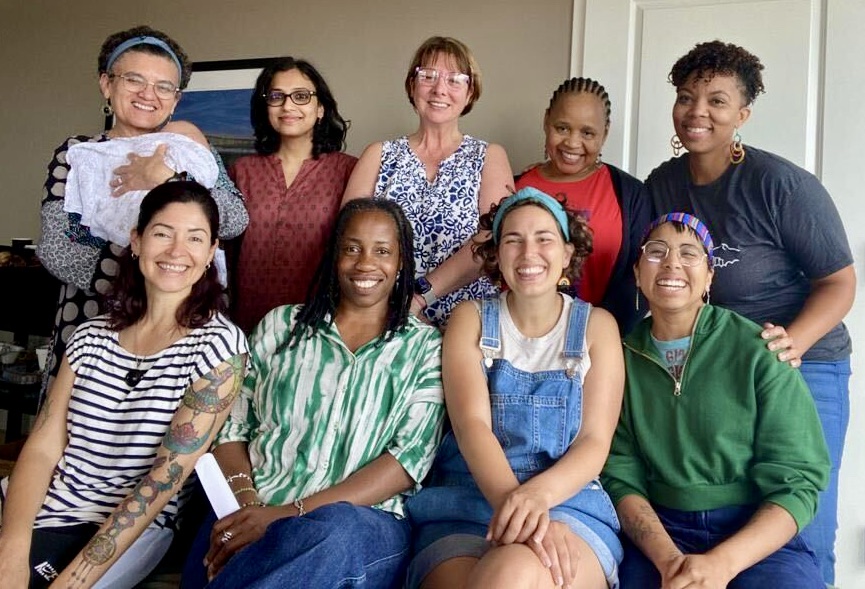 July 13, 2023: The Transformative Global Leadership Program (TGLP), a joint initiative of the Center for Innovation in Worker Organization (CIWO) and Labor Research Service (LRS) in South Africa hosted a plenary session at the 46th United Association For Labor Education (UALE) Northeast Regional Women’s Summer School at Rutgers University. The session focused on what constitutes a “gendered” approach to organizing, using ILO Convention 190 as a case study. ILO Convention 190 (C190) is the first international treaty to address violence and harassment in the world of work, adopted in 2019.
July 13, 2023: The Transformative Global Leadership Program (TGLP), a joint initiative of the Center for Innovation in Worker Organization (CIWO) and Labor Research Service (LRS) in South Africa hosted a plenary session at the 46th United Association For Labor Education (UALE) Northeast Regional Women’s Summer School at Rutgers University. The session focused on what constitutes a “gendered” approach to organizing, using ILO Convention 190 as a case study. ILO Convention 190 (C190) is the first international treaty to address violence and harassment in the world of work, adopted in 2019.
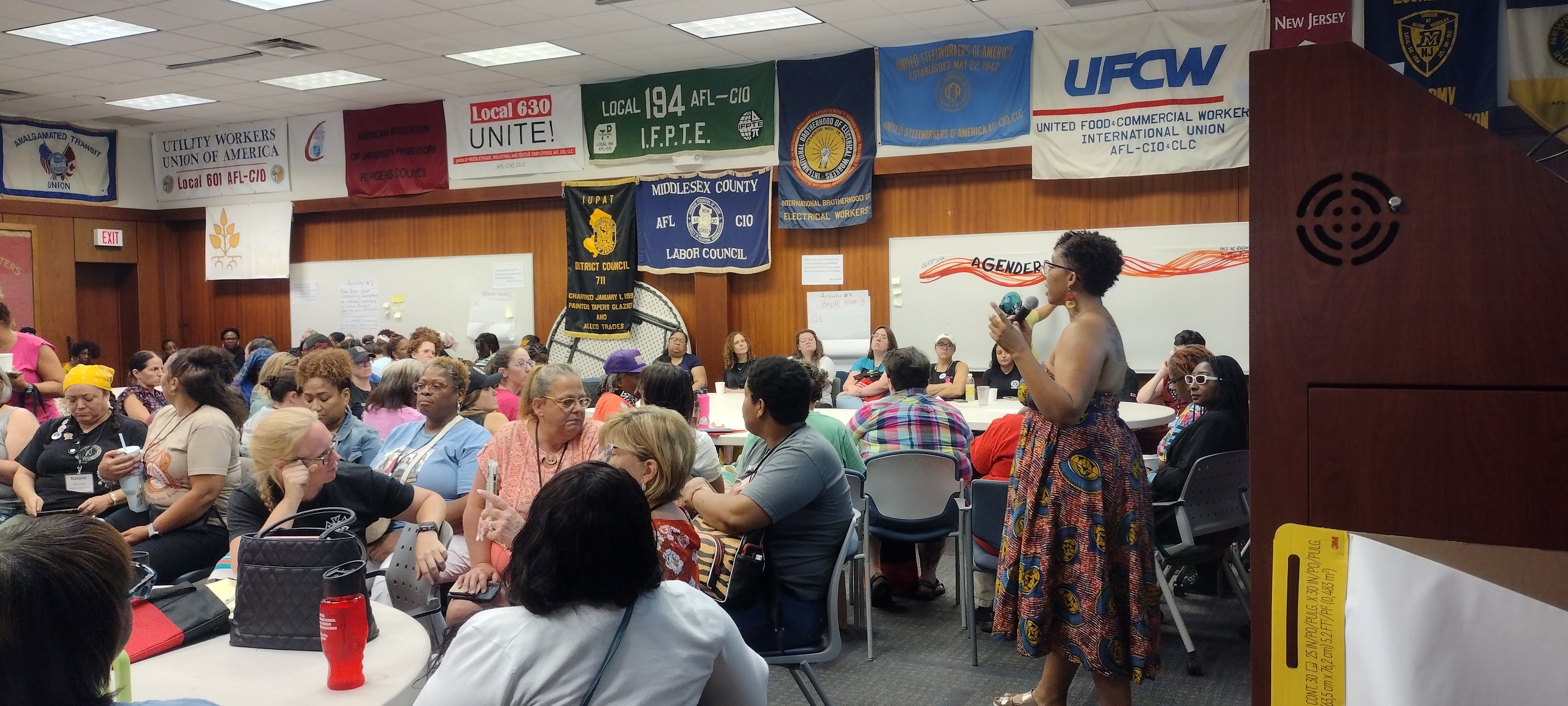 The event titled “A Gendered Approach to Organizing: Introduction to ILO Convention 190” was attended by over 140+ participants from the Women’s Summer School. The plenary session introduced key definitions and features of C190 and discussed potential ways to implement (even before ratification by countries) through Collective Bargaining Agreements, and measures on Occupational Health and Safety. This was followed by the Global Team sharing insights and lessons learned with examples of organizing using C190 in sectors such as street vendors, mine workers, domestic workers, and other groups from various regions of the world, including from South Africa and Latin America. Following the plenary, the facilitation team met with the Summer School participants in groups to answer questions and strategize ways that C190 can be integrated and implemented in their local workplace settings.
The event titled “A Gendered Approach to Organizing: Introduction to ILO Convention 190” was attended by over 140+ participants from the Women’s Summer School. The plenary session introduced key definitions and features of C190 and discussed potential ways to implement (even before ratification by countries) through Collective Bargaining Agreements, and measures on Occupational Health and Safety. This was followed by the Global Team sharing insights and lessons learned with examples of organizing using C190 in sectors such as street vendors, mine workers, domestic workers, and other groups from various regions of the world, including from South Africa and Latin America. Following the plenary, the facilitation team met with the Summer School participants in groups to answer questions and strategize ways that C190 can be integrated and implemented in their local workplace settings.
Speakers and facilitators included: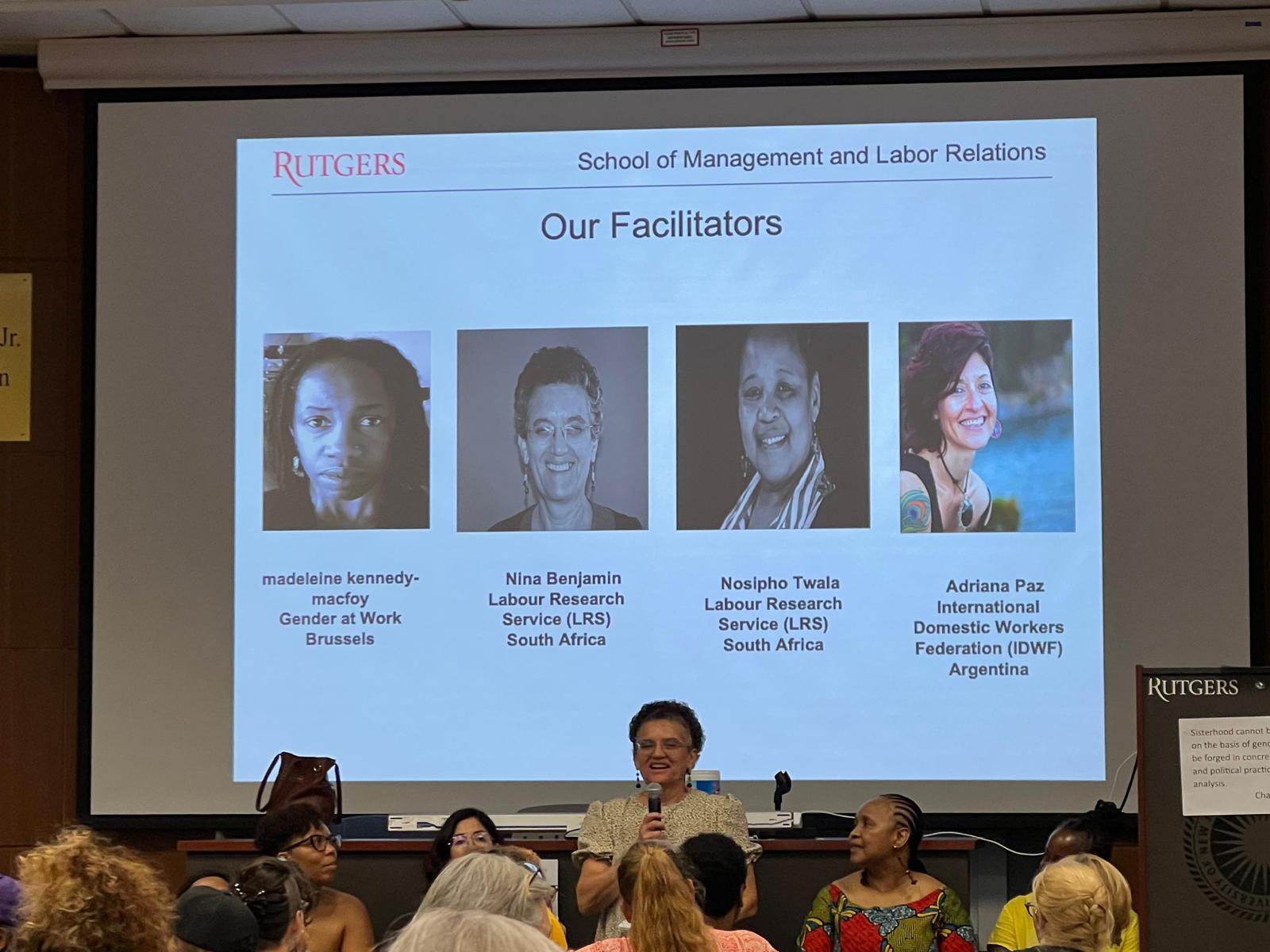
- Nosipho Twala & Nina Benjamin (Labour Research Service-LRS), South Africa
- madeleine kennedy-macfoy (Gender at Work)
- Adriana Paz (International Domestic Workers Federation-IDWF)
- Teyo Saree Abraham (STOKE Collective), visual scribe who captured discussion in live illustration
- Sheri Davis, Ardra Manasi, Patricia Munoz, and MaryGrace DiMaria (CIWO)
